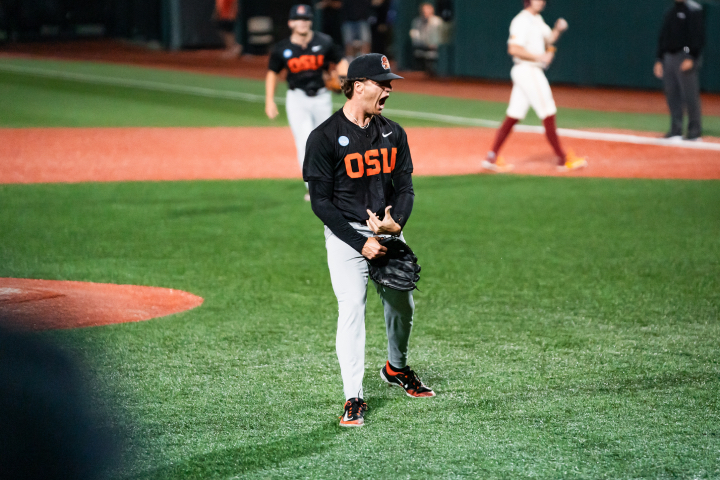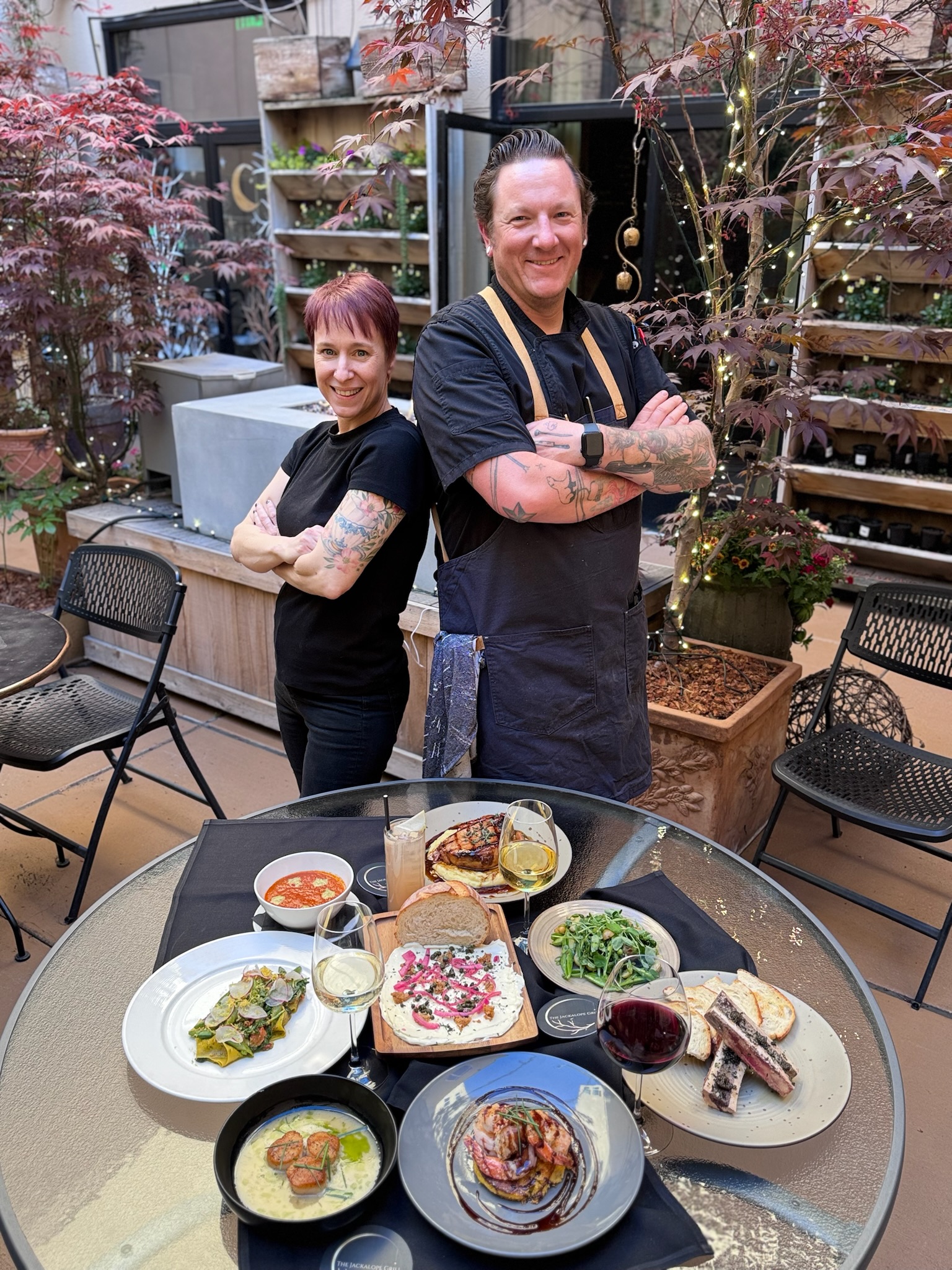Gender identity no issue at Toronto gym
Published 12:00 am Monday, March 28, 2016

- Michelle Siu / The New York TimesSavoy Howe flexes at the Toronto Newsgirls Boxing Club, which she founded 20 years ago, in Toronto. Newsgirls has evolved into a welcoming space for transgender individuals. “If they can summon the courage to get here, we do everything we can to make it a safe space,” said Howe, an amateur boxer turned coach. “And you get to punch stuff.”
TORONTO — From the doorway of the Newsgirls Boxing Club, all the trappings of a standard boxing gym are in view. The full-size ring is to the immediate right, its red, white and blue ropes and black mat at once festive and menacing.
Speed bags, heavy bags, double-end bags and a punching mannequin form a pathway — adorned with posters of female boxing champions as well as of Muhammad Ali — to the less traditional gym equipment in the back, like a piano, a Harley-Davidson motorcycle and sewing equipment tucked in along the lockers.
The signs on the bathroom door welcome all gender classifications, and a separate changing room is available for those who seek more privacy, especially the many transgender people who have found sanctuary and empowerment at this gymnasium.
Most come to box, but they may also gather around the piano for the Saturday night choir. They can join the sewing circle or quietly resupply their own cupboards with cans of spaghetti sauce and jars of peanut butter from the bins that form a food bank, set up to assist the more impoverished people who go there.
“Simple daily life can be extremely difficult and sometimes even dangerous for transgender people,” said Savoy Howe, known as Kapow, the founder and proprietor of Newsgirls. “For some, it’s a struggle just to get on the bus. If they can summon the courage to get here, we do everything we can to make it a safe space. And you get to punch stuff.”
The Toronto Newsgirls Boxing Club was not built specifically for transgender people, but all are welcome. It was founded about 20 years ago by Howe, a former stand-up comedian and actress from New Brunswick turned pugilist.
Now 49, she was one of the first female boxers in Ontario back in the early 1990s, with 14 amateur fights on her resume before giving up competition to coach.
She learned the craft at the now defunct Toronto Newsboys gym, where she was a pioneer as a woman, facing overt intimidation at times. Once, she endured a sinister beating in a sparring match from a male boxer bent on sending a message.
But she grew to love the sport and the gym, so when she opened her own for women, she honored it by gender-bending the old name.
The club sits deep within a subdivided warehouse amid furniture makers, art studios and a dog training center. Over time, the gym has emerged as a safe place for countless people with nonmainstream gender identities who might feel intimidated even glancing inside a typical male-dominated boxing gym.
“I came here with a friend to just watch and drink my tea,” said Tammy Moone, a 55-year-old forklift operator who until five years ago identified as a man. “I thought, boxing? Who would want to do that? But I put on my skirt and my heels and loved it. I came back in my workout clothes, and I never once felt out of place.”
Moone spoke in Howe’s office at the club, where every three minutes an electronic bell buzzes, synchronizing the fighters’ workouts to the length of a round.
Howe never predicted that this women’s gym, which also carves out specific time for men, would become a refuge for transgender people. But through a social program for survivors of abuse, and from word of mouth and recommendations from counseling centers, it has become perhaps the most inclusive gym for transgender people to pursue athletics of any kind in Canada and beyond.
“I’ve never seen another place like it,” said Tristan Whiston, a talented former fighter. “It’s a gym that is going to treat you like an athlete, not like a woman, not like a trans person, not like a freak.”
Howe says it is impossible to know how many attendees are transgender because she does not ask. She did not know, for instance, that Alaina Hardie, now a coach and brown belt in Brazilian jiujitsu, was transgender until Hardie asked Howe to arrange a competitive fight in 2004.
Without pause, Howe took Hardie to the Ontario boxing commission to check on the protocols. It turned out to be simple. Hardie already fulfilled all the requirements set forth by the International Olympic Committee, which the Ontario commission was following.
She had one three-round bout — believed to be the first sanctioned fight by a transgender woman in Ontario — with Howe in her corner. She lost convincingly.
“But it was an incredible experience,” Hardie said. “I loved it. I was getting hit quite a lot, and Savoy kept telling me in the most positive way, ‘If you have to, it’s OK to knock her out.’”
Today, Howe still does not ask the fighters if they are transgender. She asks everyone what pronoun to use. Some ask her to use she, others choose he. Some want to be referred to as they, and a few may vary depending on the day or even the hour.
“Everyone has the right to choose their own identity,” says Howe, who acknowledges that much of her education on the subject has come through her mistakes and faux pas.
The boxers include those who may never step inside the ring and a few who show promise as competitors. The gym holds occasional showcase events pitting their boxers with those from other gyms.
One casual boxer, a 29-year-old immigrant from Vietnam who asked not to be identified because he had not publicly revealed his transition to a man, said he learned about the gym from a flier at a counseling center bulletin board. He occasionally takes advantage of the food bank, he said, but what he loves most is the physical workout, which he was afraid to seek anywhere else.
“I got exercise and learned how to wrap my hands and punch correctly,” he said. “I always feel maybe a little bit unsafe outside. But at the gym, it is OK for me to feel like a fighter.”
Moone, the forklift operator, describes herself as a party girl and says that she has never been harassed in Toronto. With her high energy and magnetic smile, she has become a kind of morale coach for Howe.
“When a newbie comes into the gym, Tammy bounces to the door and shows them around,” Howe said during an interview at the gym.
“And I do bounce,” Moone said.
Recently, one of those newbies, after a few sessions at the gym, moved Howe emotionally with a simple question.
“Why are you so nice to trans people?” Howe recalled the person saying.
Tears welled in Howe’s eyes as she told the story. She paused, put a hand to her chest to compose herself and said, “I mean, why wouldn’t you be?”






